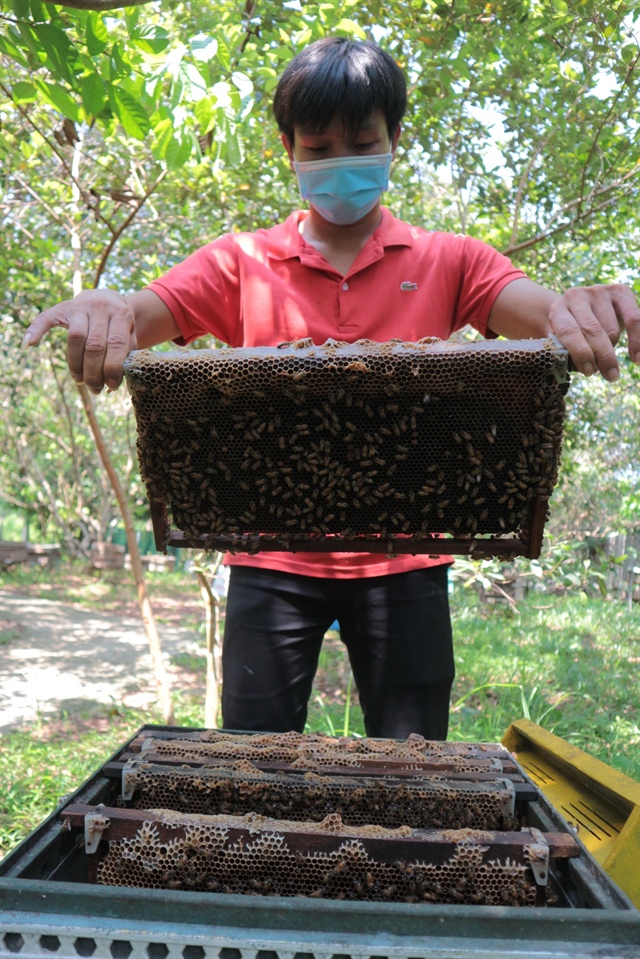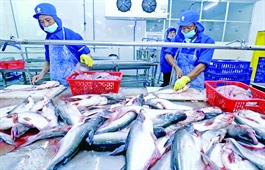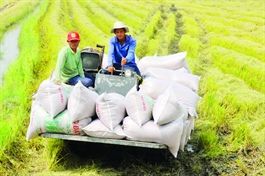US anti-dumping tax drop delights Vietnamese honey bee-sness
US anti-dumping tax drop delights Vietnamese honey bee-sness
The US Department of Commerce (DOC) has decided to decrease the anti-dumping tax for Vietnamese honey from more than 410 percent to 58.74-61.27 percent. According to Le Trieu Dung, Director of the Ministry of Industry and Trade’s Trade Remedies Authority of Vietnam, the tax reduction re-opens the US market to Vietnamese honey.

Le Trieu Dung, Director of the Ministry of Industry and Trade’s Trade Remedies Authority of Vietnam |
What is your assessment of the DOC’s anti-dumping tax decision? How will this impact the domestic honey industry?
The DOC has issued the final conclusion on the tax rate in the anti-dumping case investigation of honey imported from Argentina, Brazil, India and Vietnam. Accordingly, the anti-dumping tax for Vietnamese enterprises has been decreased sharply, from 410.9-413.99 percent in the preliminary conclusion to 58.74-61.27 percent. This is a major reduction. Compared with the preliminary conclusion, the dumping margin for Vietnamese enterprises at the final conclusion decreased by nearly seven times, helping the honey industry continue exports to the US, an important market that buys up to 80 percent of Vietnam's honey production. The continued export is crucial for Vietnam to request a further reduction in the US taxes.
Although it has been reduced, the US tax on Vietnamese honey remains relatively high. Do you think it will be further reduced in the near future?
As I said, the DOC’s preliminary conclusion is very positive, having a great impact on the Vietnamese honey industry. According to regulations of the World Trade Organization (WTO) and the US, businesses can propose that the relevant US authority review taxes on an annual basis or review new exporters for a more reasonable tax rate. In particular, we can continue to explain to US authorities the impact of the anti-dumping tax on consumers in the US to provide an objective, fair assessment compliant with the WTO’s regulations as well as US laws in order to ensure the interests of honey producers and US consumers.
Taxes on some Vietnamese exports to the US such as Tra and Basa fish, and shrimp were high in the initial anti-dumping investigation conclusion and were then reduced or zeroed after several years of review. So, I think that the continuation of honey exports to this market in addition to better preparation by beekeepers and honey manufacturers and exporters would make a further tax reduction possible in the near future.
|
How will the Ministry of Industry and Trade support honey exporters in the coming time?
The Ministry of Industry and Trade closely coordinated with relevant ministries and agencies to help beekeepers and the Vietnamese honey industry confront this problem. The ministry proposed that the US conduct a fair evaluation and investigation and strictly comply with WTO regulations. The Minister of Industry and Trade repeatedly discussed the issue directly with US authorities at different levels, urging them to ensure the legitimate interests of Vietnamese beekeepers.
The ministry will continue to coordinate with other ministries and sectors on the next steps with the goal of zeroing out the tax on honey products. It will also strengthen trade promotion to help enterprises increase domestic sales and diversify foreign markets outside the US, and facilitate efficient exploitation of free trade agreements to which Vietnam is a signatory.
What recommendations do you have for honey exporters and other manufacturers in response to foreign trade remedies?
Most Vietnamese businesses are small and medium-sized enterprises, while trade remedies are a new and complicated issue in international trade. Although it has improved, enterprises’ awareness and understanding of trade remedies must be further enriched. The government has launched a project to improve trade remedy capacity in the context of Vietnam’s FTA membership, mentioning numerous solutions to raise the awareness of enterprises, manufacturing industries and management agencies of efficient use of trade remedies.
Management renovation, modern production methods, diversification to avoid reliance on a certain market, product quality improvement and meeting standards of discerning markets are all important for Vietnamese businesses to minimize trade remedy-related impacts on trade with foreign partners.

























